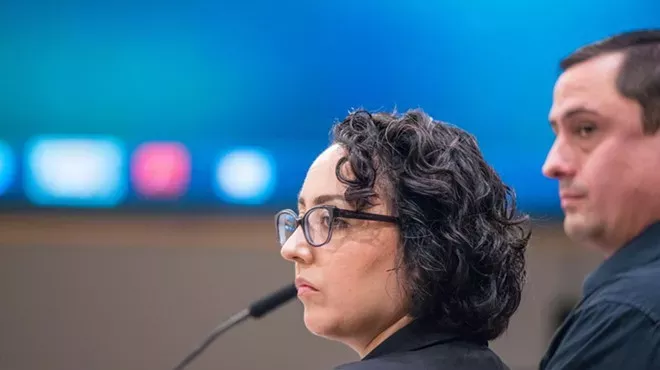
Nothing like this has ever happened in the city of Spokane.
"It's been 50 years since Spokane has had a lame duck mayor," City Administrator Theresa Sanders says.
Under the strong-mayor form of government — adopted in 1999 — Spokane has never had a mayor re-elected to a second term. And so the city has never had a situation like this: A mayor in his final year, unable to run for re-election, facing an exodus of some of his most experienced directors.
At the beginning of 2018, Jonathan Mallahan, Mayor David Condon's director of neighborhood and business services, left for a job at Catholic Charities. He was replaced by the city's Community Housing and Health Services Director Dawn Kinder. But by the end of 2018, Kinder had left as well, also for a job at Catholic Charities.
Communications Director Brian Coddington left to become the spokesman for Spokane Public Schools last July — the same year Finance Director Tim Dunivant retired. After only a year in her position, Spokane's assistant fire chief, Trisha Wolford, left to become a fire chief in Maryland.
And this week, Parks Director Leroy Eadie — a former city planner who's been with the city since 1994 — is leaving, too.
But since Condon can't guarantee the next mayor will keep any of his cabinet picks, he's been left with a dilemma.
"How do you recruit somebody who understands that they may only have less than a year to serve?" Human Resources Director Chris Cavanaugh asks.
Condon's answer? You don't. The mayor isn't replacing any of them. That choice, Sanders says, could allow the next mayor to chart a new course with new people in leadership.
But for one of those vying to be that next mayor — City Council President Ben Stuckart — that's the wrong way of thinking about it.
"I think a lot of employees would rather have managers in those positions," Stuckart says. "And I think there's a way to get there where they have stability."
IRREPLACEABLE
There are a lot of reasons why longtime staffers are leaving the city.
"I think a lot of it, as I look at our demographics, our average age is coming up on 49 years old for the entire city. Leroy retired. Tim retired," Cavanaugh says. "A lot of us have been there two decades or more."
In other circumstances, family responsibilities can play a role: Both Mallahan and Kinder recently had newborn kids, a difficult enough responsibility even without needing to juggle the high stress and long hours of a high-level city job.
Part of the recent exodus of cabinet-level staffers has been driven by the approaching end of the Condon administration.
"My job at the city is at the pleasure of the city mayor," Coddington told the Inlander last year. With no guarantee that the next mayor would keep the sometimes controversial communications director in that role, an opening at Spokane Public Schools was too good to pass up.
"It was an additional level of security for me," he said.
In the meantime, as the behind-the-scenes conflict between the council and the mayor has simmered, the Condon administration became wary of how a new hire could get caught up in the hostility.
After Dunivant, the finance director, left in July, the city initially did move to fill that position. They conducted rounds of interviews and even identified a potential candidate. But then Stuckart says he brought forward a concern from another council member about a possible perceived conflict of interest with the proposed hire: The candidate's wife works for Human Resources, Stuckart says: "How would we handle an HR complaint, when the director's wife works for HR?"
To Sanders, the prospect of the appointment becoming a nasty political confirmation fight was too big of a risk.
"Honestly, that to me was an important signal that we're risking people's careers and reputations," Sanders says. "That was the time, really the moment, that we [decided] we just need to let the next mayor decide who to bring in."
It's never easy to find a great fit for a high-level administrator position, especially in a tight job market. And the limited time frame, Sanders argues, makes that even harder.
"I can tell you that I wouldn't be able to make a decision to join an administration with just a year left," Sanders says.
Meanwhile, it's not just the political uncertainty that's at issue. Fire Chief Brian Schaeffer says Condon's approaching departure isn't what's stopping him from trying to replace Assistant Fire Chief Trisha Wolford. The problem is budgetary.
In 2016, Condon celebrated the fact the city won a $9 million federal grant, enough to hire nearly 48 firefighters. But the grant expires this year. Stuckart has championed a Feb. 12 levy that would save many of those firefighter jobs and would pay for additional police officers. But Condon has opposed it, arguing that the city's data showed little apparent benefit from the additional firefighters.
If the levy doesn't pass, Schaeffer argues, it would be unethical to try to hire a new assistant chief instead of using the money to protect firefighter jobs.
"In this situation, when we're looking at potentially losing a lot of our department, we can't bring anyone on in the administration, morally," Schaeffer says. "It's not the right thing to do."
If the levy doesn't pass, the fire department would eliminate the assistant chief position entirely, for the first time since the department's creation in 1884.
MORE WITH LESS
To City Councilman Breean Beggs, there's a solution: Temporarily promote existing city employees to the empty director positions, and then hire temps to fill the newly vacated lower-level positions. If a new mayor doesn't want to keep the interim director, the employee can simply revert to their old job.
"I'm doing both jobs right now. Maybe not as effectively as I could. You have to pick and choose what you can get done."
In fact, that's pretty close to what's been done in the case of Leroy Eadie's parks director position. Garrett Jones, the city's experienced parks planning and development manager, has been tapped to serve as the interim parks director.
The institutional knowledge that Jones will bring to bear is crucial, Eadie says.
"It's a tricky position," Eadie says. "In a lot of ways, you have three different bosses." He points out that the parks director has to answer to the City Council, the mayor and the Park Board.
But in most of the cases, responsibilities are simply being shifted or divvied up. After Coddington left, public works spokeswoman Marlene Feist found herself doing double-duty.
"I'm doing both jobs right now," Feist says. "Maybe not as effectively as I could. You have to pick and choose what you can get done."
The workload tends to pile up — and most cabinet-level appointees don't get paid overtime.
Chief Financial Officer Gavin Cooley says he and other members of the mayor's finance department have managed to spread out the finance director's duties between them.
"Having [the finance director position] open for 18 months is problematic," Cooley acknowledges. But the generally optimistic Cooley sees a benefit, too: They get more cross-training in different positions.
"It's clearly been more challenging," Cooley says. "Probably in a good way."
Meanwhile, Sanders, who has taken over some of Kinder's responsibilities, says she's felt a bit of additional pressure. "I think it slows us down a little bit," she says.
Beggs says he's noticed that slowdown. He's been frustrated with the city's slow pace in developing rental relocation and security deposit assistance for low-income tenants, but knows that city staffers are overwhelmed.
"I know that me trying to get those programs to go faster is challenging, because people have a lot to do," Beggs says.
Councilwoman Kate Burke, who has clashed publicly with city employees, points to overworked staffers as a source of frustration.
"I think it has negatively impacted my role as a councilwoman," Burke says. "Not only am I not able to get questions answered at any sort of regular pace, their plates are so full that I often times feel that I'm really burdening them while asking them questions."
Stuckart says he offered Condon a potential solution: If he and the mayor could come to an agreement about a new director for one of the vacant jobs, he'd be able to promise that he'd keep them on his staff if he were elected mayor.
"If somebody is leaving, if you want to replace them, let's do a collaborative process to replace them," Stuckart says.
But the Condon administration didn't bite.
"I think that makes an assumption that Ben is going to be the next mayor," Sanders says. What if it's Shawn Poole? What if it's Kelly Cruz? Not only that, but Sanders worries that Stuckart's plan could have sent a signal to all the employees who didn't have that guarantee that their jobs were at risk if he became mayor.
Indeed, if Stuckart wins, the fate of some of the remaining members of the Condon administration remains particularly uncertain. For example, last year, Stuckart accused Public Works Director Scott Simmons of treating city employees "like shit," going so far as to temporarily stop attending city infrastructure committee meetings because of his frustration with Simmons.
Asked in a text message if he planned to keep Simmons on if he won, Stuckart responded, "I am not answering any questions like that ;)"
PASSING THE BATON
After the next mayor is elected, more high-profile departures are inevitable: Unsurprisingly, Theresa Sanders is among them. As essentially Condon's chief of staff, she will leave when he does. Human Resources Director Chris Cavanaugh also says she's planning to leave in early or mid-2020.
Chief Financial Officer Cooley wouldn't confirm or deny reports that he also plans to leave at the end of the year, but he did say that, if he did leave, he'd make sure he stuck around long enough to hand off the baton.
"I think it's a shared viewpoint by the entire cabinet," Cooley says. "We want to make sure there's continuity."
That's a stark contrast with Burke's more conspiratorial tack. She argues that Condon is intentionally trying to sabotage his possible successor, by depriving Stuckart of expertise and momentum.
"I think he is trying to pave the worst path for the next mayor, because he thinks it will be Ben," Burke says. "I think he is trying to make the next administration fail as hard as he can."
Yet Sanders says that couldn't be further from the truth. She says that the administration is working to try to create a robust transition plan so the next administration can succeed.
"The mayor and I and the entire cabinet feel a really intense personal and professional obligation to hand off this city in the best condition we can for the incoming mayor and their administration," Sanders says. "We think about it a lot." ♦


























